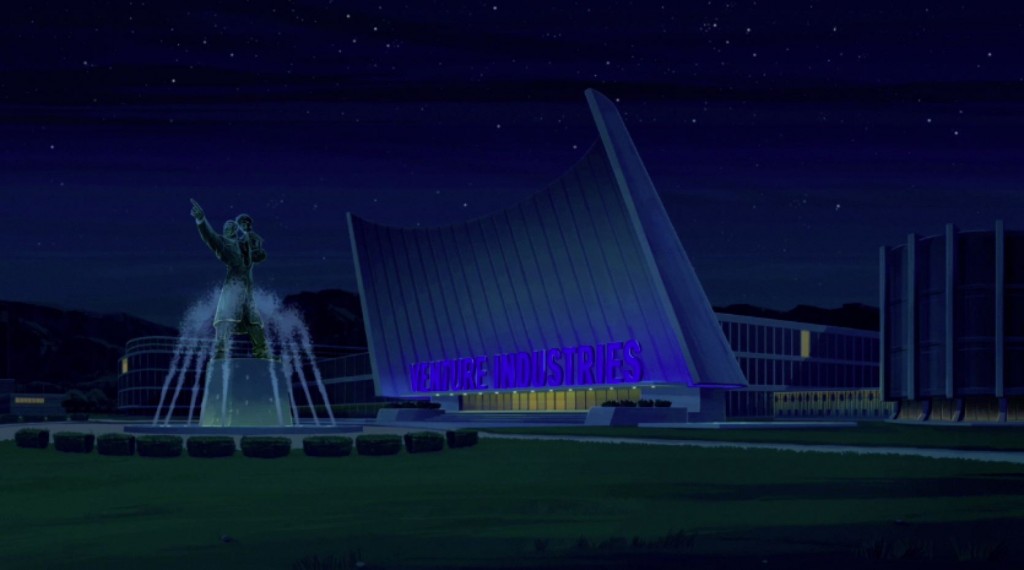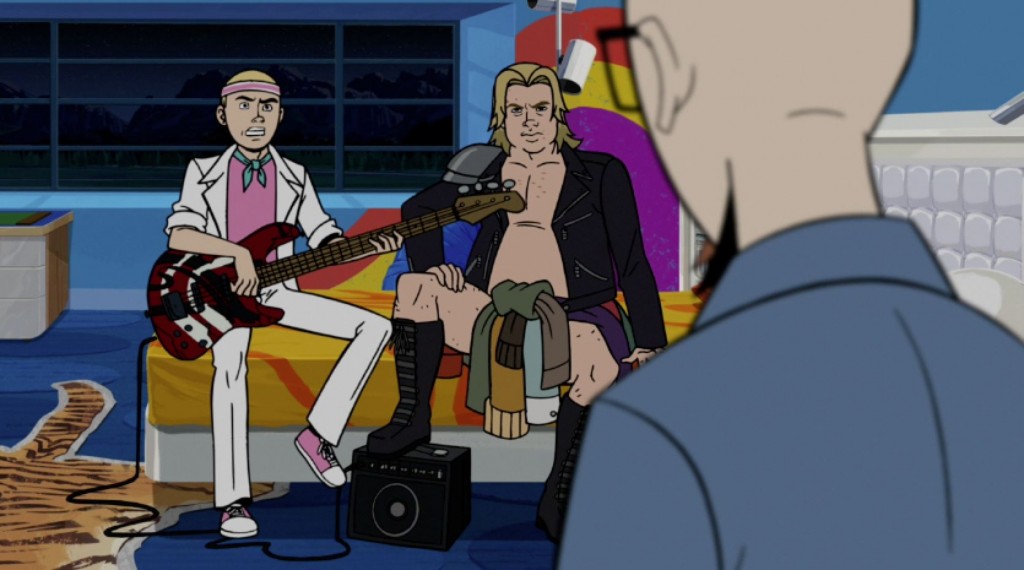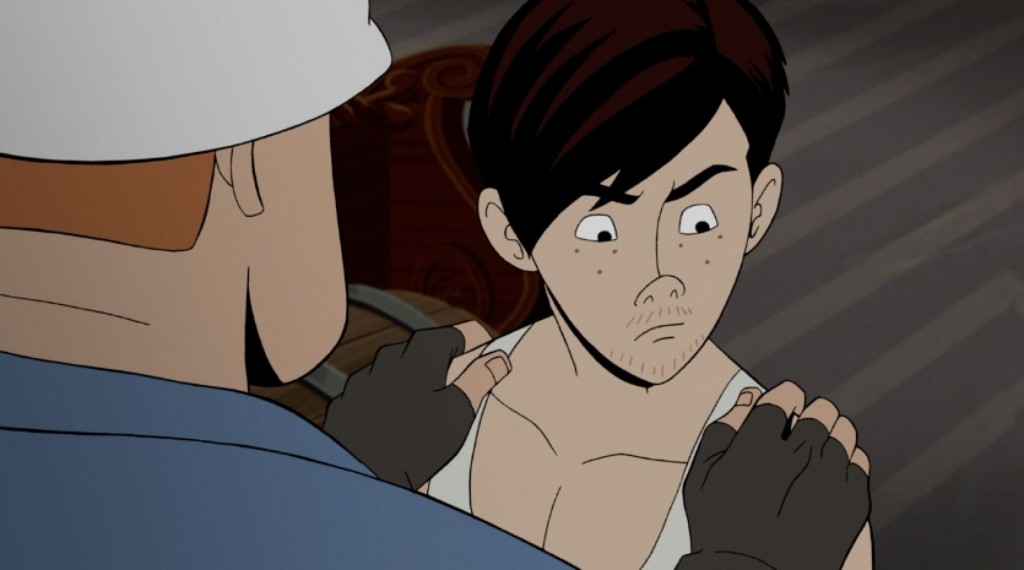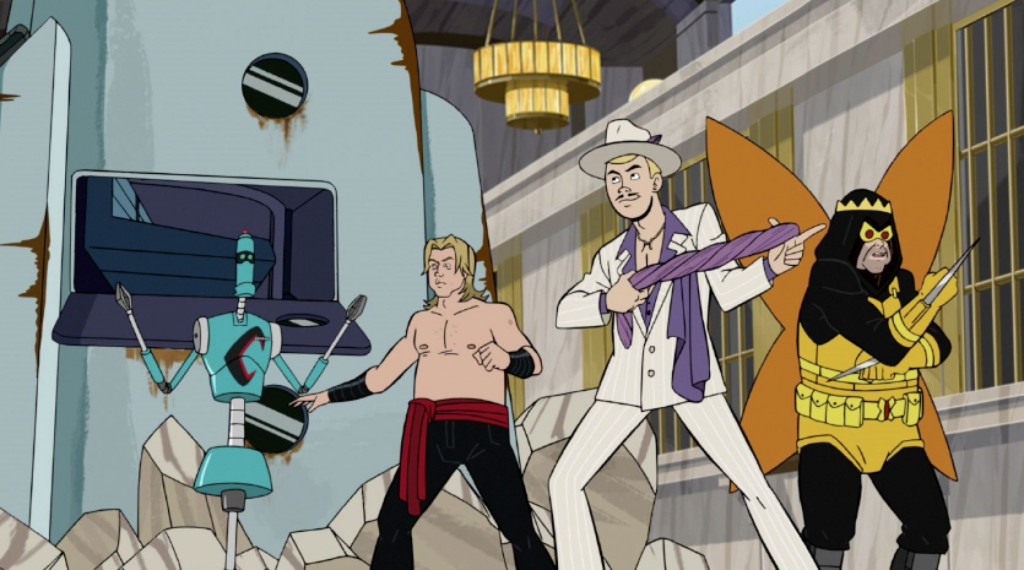The Venture Bros: “Momma’s Boys” part 1
When reasonable people gather to discuss Batman, at some point someone clears their throat and says “Well you know, according to some schools of thought, Bruce Wayne died the night his parents died; from that moment on he was Batman, and ‘Bruce Wayne’ became the mask.” This is certainly a compelling argument with a subversive impact, but it only works if we proceed with the supposition that Bruce Wayne is completely insane. A sane man does not assume the personality of a night-time crimefighting vigilante and relegate his “getting by” personality to that of a billionaire businessman.
And, of course, there are people who would argue that, yes, Bruce Wayne is insane, that The Bat has taken over and subsumed his personality like Norman Bates’s mother. After all, Batman has always been a comic about insanity, far more than any other superhero title. The only thing that all Batman’s villains have in common is that they are stark raving mad. As a matter of fact, George Clooney once pitched a Batman movie to Warner Bros where it would be revealed at the end that, a la Sucker Punch, it is Bruce Wayne who has lived in Arkham Asylum all these years, fighting his never-ending war on giggling psychopaths from the confines of a padded cell.
All of which brings us to tonight’s Venture Bros episode, “Momma’s Boys.”
As we’ve come to expect from the best episodes from The Venture Bros, “Momma’s Boys” presents a bundle of troubling, serious psychological issues and questions in a colorful, ridiculous package. It asks us to “buy” the farcical situation of Rusty believing that a cassette-tape teddy bear is his best friend, then uses that inciting incident to launch a typically twisted, peculiar journey into questions of belief, pretense, delusion and identity.
It begins simply enough. Hank’s friend Dermott (who I think we already know is actually Hank’s half-brother Dermott, although I’m sure they do not) are hanging out in Hank’s room playing music. Rusty comes to alert them to “lights out” and is angered by their outrageous costumes (I’m sure someone steeped in 80s culture can tell me who they’re supposed to look like). Hank admonishes Rusty “Hey, boys can play dress-up too!” as though Rusty’s life wasn’t plagued with boys who play dress-up, from his tenants Dr. Orpheus and the dudes from SPHINX to the armies of dual-identity supervillains who descend on his house with blinding regularity. Rusty tells Dermott to take out the trash, then goes to Dean’s room to tell him “no sexting.” Dermott wants to know “What’s up with your dad?” and it took me a moment to realize that Rusty is actually acting like a dad – square, demanding and embarrassing, but laying down the law for his teenage boys and heading up the household. Any other night he’d be in the lab or fighting an insane guy in a costume.
Hank and Dermott, looking to escape for the night, set up a Teddy Ruxpin-style talking bear toy for Rusty to talk to on the phone. Rusty has, apparently, been talking to Teddy on the phone for quite a while now and a deep friendship has formed. This is, of course, absurd, and like all absurd things on The Venture Bros is a signpost to depth of character. Rusty is so friendless, he gladly accepts the company of a disembodied voice on the phone, one who talks of “By-Golly Gulch” and “Grumpy Bandersnatch.” Why would he not realize that Teddy is an automaton? Because he has no real interest in people, he only has interest in himself, and Teddy gives him an opportunity to talk. When Rusty calls Teddy “playa” and generally talks to him as though he’s a mid-90s gang-rapper, he’s only talking to himself. That’s how Rusty sees himself, as a member of a gang, a life filled with easy money and easier women.
Rusty’s friendship with Teddy (which is only a friendship with himself) becomes an addiction. As Teddy is not a real person, Rusty’s Teddy-crush can only be projection. It’s like he’s experiencing the same thing all the other characters on the show go through, but externally. Any sane person would recognize that they were talking to a machine designed to entertain children, but Rusty has created an entire elaborate persona to house Teddy in, one that allows him to blow right past phrases like “sliding down rainbows” and “Honey River” so that he can continue to live his fantasy of having a friend. He loves Teddy, which is another way of saying that Teddy allows him to love himself. All of the Venture-verse’s assorted perverts and miscreants create personae they allow them to express their inner fantasies, but I think Rusty is the first character to create that persona outside of himself. Rusty is so wrapped up in his fantasy that even when he finds the bear in Hank’s room, he looks right past the obvious evidence staring him in the face and decides that there is a criminal conspiracy afoot.
Let’s call Rusty’s rescue of Teddy the a-story and Hank’s complicity the b-story. The episode’s c-story would then be Dean’s pursuit of Myra, the woman he believes to be his mother. In the same way Rusty, in his bitter loneliness, reaches out to a voice on the phone, Dean reaches out to a woman who is obviously insane to fill a hole in his life. Sgt Hatred is right when he guesses that Dean has a hole to fill, he just places it in the wrong spot of Dean’s anatomy.
Meanwhile, Hank, Dermott and Gary (now dressed as a Jedi) plot to break in to Dunwich Asylum, where the actor who did the voiceover for the Teddy doll now lives, and here the Batman angle comes in: Dunwich Asylum is a stand-in for Arkham Asylum (and both “Dunwich” and “Arkham” are names drawn from Lovecraft, so we should be grateful that no Lovecraftian horrors present themselves in this episode). By the time Batman Forever came out, it had dawned on me that Batman’s world has no prisons, only an asylum – one asylum – holding all the creatures of Batman’s nightmares. The name “Arkham” was no doubt a nod to Lovecraft in the original comics, and the monsters of Lovecraft, on a good day, drove everyone who looked upon them insane.
And so, “Momma’s Boys” creates a version of Arkham Asylum where everyone, every patient there (and some of the staff) are all supervillains, all people from the Ventureverse who – get this – cannot function in the real world. The Monarch drifts around in his flying cocoon, Sgt Hatred has to take medication to keep him from raping boys and Phantom Limb has a super-team made up of household items, but the inmates of Dunwich Asylum are too crazy to be let out into this society.
To break into Dunwich Asylum, Hank and company must act insane, which they do by robbing a bank in the manner of Batman villains: with an enormous drill-vehicle and personae that are only slightly to the left of what these individuals would actually do if they took the plunge into alter-ego land. Hank chooses a Hank theme, designing a name that means “Hank Hank,” using a hank of yarn as a weapon and also carrying a hankie. That’s pretty absurd, and yet his home base at the Venture Compound is “HankCo,” which offers everything from dining to travel planning. Hank is very into being “Hank,” it’s not surprising that his alter-ego would be the Hankiest Hank of all Hanks. Hank has tried on more personae than anyone else in The Venture Bros, how far is “Enrique” from the own shadows of his ego? Gary presents himself as “The Viceroy,” which he was seriously calling himself just a few episodes ago, and Dermott calls himself “Flying Sidekick” complete with nunchucks he can’t control. These are all just the characters personae writ large, and not even that large. The implication is that it doesn’t take that much for a Venture character to go from functional to certifiable.




What I wanna know is who’s going to pay for the repairs to the bank?
The Middle Class, who else? Thanks, Obama!
sigh…
Todd, the middle class was being screwed long before Obama got in office and will continue being screwed long after his is out of office.
T. Viceroy has Guild membership as a duo. If Gary’s guild dues are up to date, the guild paid for the damage to the bank and kept it out of the papers. And may have done a bit extra since the Original Guild was founded by Hank’s Great great grandfather.
That makes perfect sense.
Just out of curiosity, I decided to see in which languages Enrico Matassa were, in fact, Hank Hank. Since he’s a self-proclaimed “latin playboy”, I checked Spanish first. No match on the last name, and the first would be Enrique (Henry), or since it’s Hank, the diminutive Quique. Enrico is Italian for Henry (the diminutive that would’ve been equivalent of Hank is Rico), and Matassa is Sicilian in origin: which can mean either a person who works as a silk producer, or refers to a hank of silk. The irony here is that he hates being called Henry, yet portrays an insane super criminal who is a Henry of sorts, but overcompensates with Hank-themed accessories.
There actually is such as thing as a Viceroy butterfly, and it does impersonate the Monarch butterfly, as most predators know that the Monarch is a poisonous sky flower. Without SPHINX as a surrogate cosplay, Gary’s identity crisis becomes more pronounced.
Actually, struggling for identity was a major theme in this episode (and the season thus far). Anyone catch the Rusty unconsciously identifying himself with Grumpy Bandersnatch? First he points out Grumpy is that way for “not swimming in the Honey river” (obvious sex metaphor) and then immediately admits that he hasn’t been swimming there, either. Rusty always has an excuse for his actions and motivations, but only to Ted he could admit that he is, in fact, a grumpy dick (albeit unaware that he’s admitting it, but obliviousness is Rusty’s curse and virtue).
Strangely though, I thought the d-plot with Dermott was the most pronounced of this theme. The Ventures view him as a (relative, no pun intended) example of someone living a normal life, at least in comparison to the dysfunction of super science and boy adventuring. When Dermott points out the strangest of Gary living in their yard, Hank points out that 1970’s David Bowie (the late 70’s, Thin White Duke era Bowie, for anyone keeping score) slapped down Phantom Limb a few feet from where they were sitting. It’s because of the fact that weirdness is a constant in the Venture family’s life that Dermott, the archetypal weird kid that everyone grew up with and tried to avoid, can be the normal one, which actually seems to be having a positive effect on him, while his influence on Hank seems to be making him more rebellious (not to mention self-possessed, at least with putting his name on everything).
Dermott is less eager with the boasting of fantastic feats of imaginary martial arts and occasionally creates an actual dialogue with the people around him: he’s letting his guard down enough that his weird defense mechanisms aren’t so frequent and he’s actually becoming tolerable. However, even before learning Rusty is his father, there’s been these odd signs of him acknowledging his role as the Jon Snow of House Venture. Notice how when he throws the “Go Team Venture” V with Gary (another lost bastard, albeit metaphorically with the Monarch), Hank loses interest in doing it, not unlike an older brother losing interest in a hand-me-down. Or how Dermott chooses the name “Flying Sidekick”, unaware he’s making himself out to sound like a lesser member of their imaginary crime syndicate. This results in him going to regular jail, while Gary and Hank get to go to the madhouse that is their birthright (probably another Game of Thrones analogy in there about going to the Wall while the legitimate children rule the North, but let’s not spread that any thinner).
In the conclusion of the d-plot results in success for Dermott: by using his newfound ability to speak to Helper (not unlike Parseltongue), he mentally summons Doctor Orpheus (not unlike an owl showing up with an invitation to wizard school), who rescues him from jail and reveals to him that Rusty is his father (not unlike learning he’s the Boy Who Lived who no longer has to sleep under the stairs), all while accepting the superlative weirdness of the entire situation with calm bemusement. Contrast that to Dean losing the delusion of having a mother, or how his fantasy hallucination of young adult literature in “Battle of Cremation Creek” ends with him having an emotional breakdown concerning yetis while destroying the cocoon’s engines. Dermott moves up, Dean moves down, and Hank stabilizes somewhere in a comically ego-maniacal haze.
My only comment is that I got the impression that Dermott was aware of the double-edged nature of his nickname. Hank and Gary both seem to realize that they’ve chosen ridiculous personae (big step forward for Gary), I assumed that Dermott knows that “Flying Sidekick” has a double meaning.
K I know this has nothing 2 do w/the point but I can’t fight the geek voice n my head, batman does have a prison “blackgate” where all the saner of his villains & all the henchmen go
You know, I’d never even heard of Blackgate before The Dark Knight Rises, and I’ve been reading Batman comics for thirty-five years.
Read “Madmen Across the Water”. Kooks vs. criminals. 🙂
“Sgt Hatred is right when he guesses that Dean has a hole to fill, he just places it in the wrong spot of Dean’s anatomy.” I see what you did there, Todd.
Thanks for the write-up. Your analysis never fails to deepen my appreciation of this truly awesome show.
ok, in this episode, what did hank say when he answered the phone? that was from something (I think a commercial) anyone know